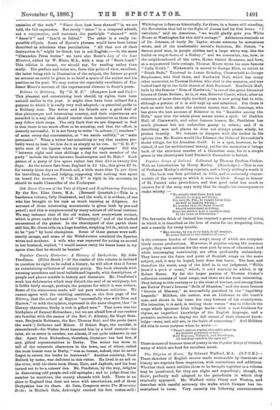Popular County Histories : A History of Derbyshire. By John
Pendleton. (Elliot Stock.)—If the reader of this volume is inclined to question its right to be called a history, he will allow that it forms an entertaining collection of county gossip. The book abounds with amusing anecdotes and local ballade and legends, with descriptions of people and places notable in history and literature. Mr. Pendleton's work has deficiencies which may disturb the soul of an antiquary, but it fulfils fairly enough, perhaps, the purpose for which it was written. Some of the statements made will not pass without criticism. We cannot agree with the startling assertion, on the first page of the History, that the school at Repton "successfully vies with Eton and Harrow," or with the opinion, expressed in the same chapter, that "in literary characters Derby is rich in gifted men." That town was the birthplace of Samuel Richardson ; but we are afraid few of our readers are familiar with the names of the Rev. C. Allestry, Sir Hugh Bate- man, Benjamin Robinson, the Rev. Thomas Bott, and the poets (save the mark !) Griborne and Milner. If Robert Bage, the novelist, is remembered—for Walter Scott honoured him by a brief memoir—his tales, six or seven in number, are almost, if not quite unknown in our day. Apart from Richardson, therefore, literature has had few, if any, gifted representatives in Derby. The writer has more to tell of the eccentric characters in the town, one of whom, called the most honest man in Derby, " was so honest, indeed, that he never forgot to return the books he borrowed." Another celebrity, Noah Bullock by name, was deficient in this virtue. He lived in an ark on the river, with his three sons, Show, Ham, and Japheth, and his boat turned out to be a coiners' den. Mr. Pendleton, by the way, delights in discovering odd people and odd epitaphs; and to judge from the number he mentions, the county abounds with both. There is no shire in England that does not teem with associations, and of these Derbyshire has its share. At Ilam, Congreve wrote The Mourning Bride ; in Matlock Dale, Arkwright erected his first cotton-mill
Whittington is famous historically, for there, in a house still standing, the Revolution that led to the flight of James had its first home. "I calculate," said an American, "we would gladly give you White
House at Washington for this doll's cottage." Ashbonrne reminds as of Dr. Johnson, of burly Dr. Taylor, whose sermons he sometimes wrote, and of the comfortable rector's factotum, Mr. Peters, " a decent good man, in purple clothes and a large white wig, like the butler or major-domo of a Bishop ;" and we remember, too, how, in the neighbourh000d of the town, Hume visited Rousseau, and how, at a sequestered little cottage, Thomas Moore wrote his once famous " Lalla Rookh." Wirksworth is sacred to George Eliot, or rather to "Dinah Bede," Tunstead to James Brindley, Chesterfield to George Stephenson, who died there, and Hardwick Hall, which has many other memories, to Thomas Hobbes, who died in the mansion, and was buried hard by in the little church of Ault Hucknall. Hardwick Hall, built by the famous " Bess of Hardwick," is one of the great historical houses of Great Britain; so is, or was, Bolsover Castle, which, after an existence of more than eight hundred years is now going fast to ruin, although a portion of it is still kept up and inhabited. But there is such an eerie look about the ancient rooms, that Mr. Jennings, who has given the beat account of Bolsover in his " Rambles among the Hills," says that the whole place seems under a spell. Of Haddon Hall, of Chatsworth, and other famous houses, Mr. Pendleton has mach pleasant but not unfamiliar gossip to relate ; and if in describing men and places he does not always praise wisely, he praises heartily. We venture to disagree with the author in his opinion that Mr. Ruskin would like Edensor, the Duke of Devonshire's model village, for his Arcadian Guild. It is a spot, however, to be visited, if not for architectural beauty, yet for the memories it brings back of the atrocious murder of a blameless man, for in a simple grave in the churchyard Lord Frederick Cavendish is buried.














































 Previous page
Previous page